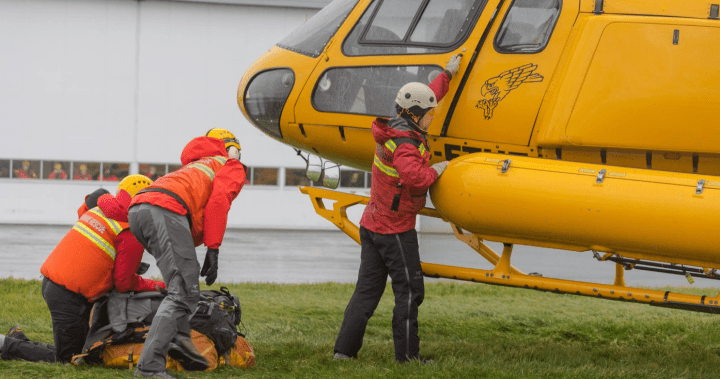daftandbarmy
Army.ca Dinosaur
- Reaction score
- 31,883
- Points
- 1,160
Trouble 't mill...
A letter to Premier David Eby from the former head of the B.C. Search and Rescue Association accuses the government ministry overseeing search and rescue of a lack of respect for volunteers, bordering on abuse. Kristen Robinson reports.
Several current and former leaders of B.C. search and rescue (SAR) groups have penned a letter to top provincial government officials, alleging mistreatment of their volunteers by staff in one department.

The letter addressed to Premier David Eby, but sent to MLAs and members of the official Opposition as well, points fingers at Emergency Management and Climate Readiness (EMCR).
In addition to claiming that the ministry houses a “systemic attitude of disrespect and institutionalized bullying” of search and rescue volunteers, it alleges its staff have not addressed substantial safety concerns raised in an audit of certain SAR groups.
It further claims the department is not embracing the most advanced SAR technology, and calls on the government to restore its relationship with the SAR signatories by giving them more standard-setting authorities.
The signatories — including the former CEO of the B.C. Search and Rescue Association and the current presidents of the Houston, Whistler and Fort St. James SAR teams — also want an independent audit of EMCR conduct and practices, and recommends certain unnamed staff in the ministry be reassigned.
Environment Minister George Heyman, who is also acting as minister of EMCR, was not available for an interview Monday.
“Search and rescue volunteers play a critical role in providing life-saving services across our entire province. We respect and appreciate their training, knowledge and dedication,” Heyman said in an emailed statement.
“The concerns raised in this letter are very troubling, and I intend to meet with the BC Search and Rescue Association this month to discuss and address these concerns.”
Heyman said he is confident the provincial government can reestablish “the trust and effective collaborative relationships that British Columbians need and expect” from its elected officials and SAR volunteers.
Some 3,400 volunteers from 78 SAR groups across the province save 1,000 lives on average each year.
In an interview, former B.C. Search and Rescue Association president Dwight Yochim said the “rift” has developed in the past six months in particular, as volunteers faced tremendous “pressure” from EMCR.
“They were not seen with any respect by EMCR. Their advice, their recommendations were seen as more of an irritant,” he alleged. “They just didn’t think those members’ opinions really counted and it was very discouraging.”
He cited the example of North Shore Rescue — which is not a signatory to the letter — having to go public with its concerns before it was allowed to do nighttime hoist rescues from helicopters in October 2022.

 globalnews.ca
globalnews.ca
6 B.C. search and rescue leaders pen finger-pointing letter to provincial government
A letter to Premier David Eby from the former head of the B.C. Search and Rescue Association accuses the government ministry overseeing search and rescue of a lack of respect for volunteers, bordering on abuse. Kristen Robinson reports.
Several current and former leaders of B.C. search and rescue (SAR) groups have penned a letter to top provincial government officials, alleging mistreatment of their volunteers by staff in one department.

The letter addressed to Premier David Eby, but sent to MLAs and members of the official Opposition as well, points fingers at Emergency Management and Climate Readiness (EMCR).
In addition to claiming that the ministry houses a “systemic attitude of disrespect and institutionalized bullying” of search and rescue volunteers, it alleges its staff have not addressed substantial safety concerns raised in an audit of certain SAR groups.
It further claims the department is not embracing the most advanced SAR technology, and calls on the government to restore its relationship with the SAR signatories by giving them more standard-setting authorities.
The signatories — including the former CEO of the B.C. Search and Rescue Association and the current presidents of the Houston, Whistler and Fort St. James SAR teams — also want an independent audit of EMCR conduct and practices, and recommends certain unnamed staff in the ministry be reassigned.
Environment Minister George Heyman, who is also acting as minister of EMCR, was not available for an interview Monday.
“Search and rescue volunteers play a critical role in providing life-saving services across our entire province. We respect and appreciate their training, knowledge and dedication,” Heyman said in an emailed statement.
“The concerns raised in this letter are very troubling, and I intend to meet with the BC Search and Rescue Association this month to discuss and address these concerns.”
Heyman said he is confident the provincial government can reestablish “the trust and effective collaborative relationships that British Columbians need and expect” from its elected officials and SAR volunteers.
Some 3,400 volunteers from 78 SAR groups across the province save 1,000 lives on average each year.
In an interview, former B.C. Search and Rescue Association president Dwight Yochim said the “rift” has developed in the past six months in particular, as volunteers faced tremendous “pressure” from EMCR.
“They were not seen with any respect by EMCR. Their advice, their recommendations were seen as more of an irritant,” he alleged. “They just didn’t think those members’ opinions really counted and it was very discouraging.”
He cited the example of North Shore Rescue — which is not a signatory to the letter — having to go public with its concerns before it was allowed to do nighttime hoist rescues from helicopters in October 2022.

6 B.C. search and rescue leaders pen finger-pointing letter to provincial government | Globalnews.ca
The letter addressed to Premier David Eby, but sent to MLAs and members of the Official Opposition as well, points fingers at Emergency Management and Climate Readiness.




